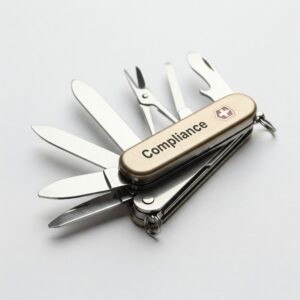In a world increasingly powered by artificial intelligence, compliance professionals are stepping up to face new challenges and responsibilities. AI’s promise to streamline and transform business processes comes with its own set of ethical, legal, and operational complexities—especially in compliance. Through the ICA Specialist Certificate in AI for Compliance Professionals, I gained a deeper understanding of AI’s role in the industry and the evolving responsibilities of compliance officers. Here are the top five lessons from this transformative course:
1. Grasping the Types and Functions of AI in Compliance
The course began with an in-depth exploration of AI, including its foundational concepts, types, and development. This foundational knowledge was essential to understanding the unique challenges AI presents in a compliance context. Narrow or “weak” AI, the most prevalent form, is used widely in tasks like transaction monitoring and fraud detection, allowing for greater accuracy and reduced manual effort. We also delved into theories surrounding general and self-aware AI, concepts that remain largely theoretical but could one day present ethical and practical challenges that will redefine compliance. Gaining a solid grounding in AI’s history and functionality helped clarify its capabilities and limitations, both current and future.
2. The Transformative Role of AI in RegTech
One of the most practical lessons from the course was understanding AI’s transformative impact on regulatory technology (RegTech). In particular, AI-driven RegTech tools are redefining how we handle vast amounts of data, automate compliance tasks, and mitigate risks. For example, machine learning algorithms are now used to assess risk, identify patterns in financial transactions, and detect potential fraud—tasks that were previously time-consuming and prone to human error. Case studies on the adoption of AI in financial services revealed how companies are leveraging AI to stay compliant with regulatory requirements while also gaining operational efficiency. The course emphasized how AI-enabled tools can streamline compliance monitoring, risk assessment, and even reporting, making compliance not only faster but more accurate and insightful.
3. Ethics and AI: Navigating Complex Dilemmas
With AI’s immense potential comes a responsibility to address the ethical issues that arise from its use. The course introduced essential ethical frameworks, including utilitarianism and deontological ethics, and applied them to real-world AI scenarios. These frameworks are more than theoretical—they serve as guiding principles to assess AI’s impact on individuals and society. For instance, compliance professionals must consider transparency, accountability, and bias when deploying AI, particularly in high-stakes areas like hiring, financial services, and risk assessment. Understanding these ethical considerations empowers us to navigate dilemmas like data privacy, algorithmic fairness, and the potential for job displacement. By balancing compliance with ethical responsibility, we can ensure that AI technologies are used not just legally, but also fairly and thoughtfully.
4. The Expanding Role of Compliance Professionals in Guiding Ethical AI
Another major insight was recognizing the evolving and strategic role of compliance professionals as leaders in ethical AI implementation. In the age of AI, compliance officers are not just regulatory gatekeepers; they are increasingly tasked with shaping and advocating for responsible AI practices within their organizations. The course emphasized that compliance professionals are uniquely positioned to champion ethical AI, helping to establish guidelines and policies that promote transparency, accountability, and alignment with core organizational values. This proactive role in fostering a culture of ethical awareness is particularly crucial as AI systems become more embedded in decision-making processes. Compliance professionals are now expected to bridge the gap between technology and ethics, guiding organizations toward responsible AI deployment that builds public trust.
5. Future-Proofing Compliance in an AI-Driven World
Lastly, the course underscored the importance of future-proofing compliance frameworks as AI technologies advance at an unprecedented pace. While current AI applications offer numerous benefits, future developments in areas like natural language processing, predictive modeling, and self-learning systems could drastically alter the regulatory landscape. As a compliance professional, staying informed and adaptive to these changes is crucial. The course highlighted the need to anticipate regulatory shifts, such as evolving data privacy laws and potential global standards for AI ethics. For example, Europe’s AI Act and similar regulations around the world are setting new standards for AI accountability and transparency, and compliance professionals will need to adjust strategies to align with these frameworks. The lesson here is clear: in a rapidly changing environment, a commitment to continuous learning is essential to stay compliant and ahead of emerging risks.
Conclusion
The ICA Specialist Certificate in AI for Compliance Professionals offered both a technical and ethical foundation, helping to navigate the complexities of AI in compliance. From understanding the fundamentals of AI to embracing an active role in guiding ethical practices, each lesson has reinforced the importance of a balanced approach to technology. Compliance professionals are now at the forefront of AI’s ethical landscape, where decisions made today will shape public trust, regulatory standards, and industry practices for years to come.
By integrating AI responsibly and aligning it with our values, we can harness its transformative potential while safeguarding society’s interests. As AI continues to evolve, so too must our commitment to ethical, forward-thinking compliance practices.







